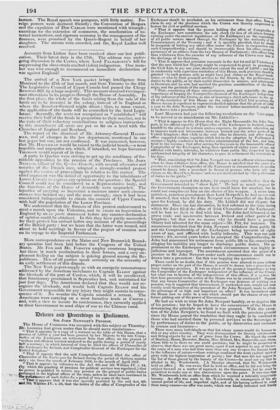The arrival of a New York packet brings intelligence from
Montreal to the 27th of last month, and from Toronto to the 22d. The Legislative Council of Upper Canada had passed the Clergy Reserves Bill, by a large majority. This measure received two impor- tant alterations in its progress through the House of Assembly. In the first place, the whole of the funds arising from the sale of the lands are to be invested in the colony, instead of in England or where the Receiver-General might direct : thus, to some extent, the application of the funds will be controlled by the local Legis- lature. Secondly, the sects not recognized as " established" will receive their half of the funds in proportion to their number, not in the ratio of their voluntary contributions to religious instruction : by this amendment all sects are put so far on a level with the Churches of England and Scotland.
The report of the dismissal of Mr. Attorney-General HAGER- atArs, and of changes in the law department, mentioned in our last paper but one, are not confirmed. It was rumoured, however, that Mr. HAG ERMAN would be raised to the judicial bench,—a most impolitic and unpopular act, which, if intended, we hope Governor T1OMS0 N would repent of in time.
A party in Quebec were striving to get up the semblance of for- midable opposition to the reunion of the Provinces. Mr. JOHN NEri.soN, editor of the Qrebee Gazette, with several advocates and notaries of the French race, adopted a strongly-worded protest against the course of proceedings in relation to this matter. The chief a rgu me nt was the denial of opportunity to the inhabitants of Lower Canada to express any opinion on tic question : the Special Council could not be considered as a Representative body, and the functions of the House of Assembly were suspended. The injustice of carrying so important a measure under such circum- stances was insisted on ; and the more strongly, since it had been considered indispensable to obtain the consent of Upper Canada, with half the population of the Lower Province. We understand that the framers of this protest endeavoured to steal a march upon the Unionists, and to create an impression in England by an ex parte statement before any counter-declaration
of opinion could be obtained. In this they have partly succeeded, for their protest has arrived before any account of the proceedings of the British party : but we learn that the latter were roused, and about to hold meetings in favour of the project of reunion now on its voyage to the Imperial Parliament.


























 Previous page
Previous page